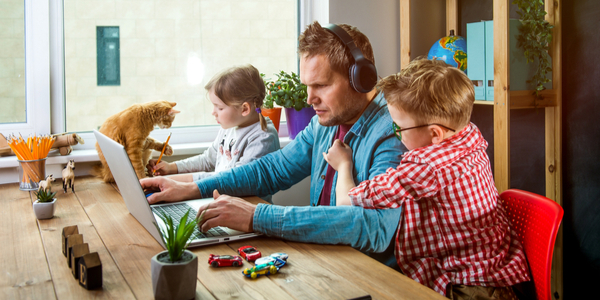How can I look after my employees when they are working from home? (Part 1)
There is no question that the pandemic has brought about massive changes to our lives, and especially the way we now do work. The Public Health Act 2010 No 127 states that an employer must allow an employee to work from that person’s place of residence when it is practical, which means a significant number of workers were told to work from home in March and April this year.
Whilst the concept of working from home existed before the pandemic, what is important is the number of workers now doing it post pandemic. This phenomenon has exposed some ambiguity in terms of safety management, related to which safety laws apply when working from home, and what are the employer’s Workers Compensation liabilities when an employee is hurt in their own home.
What are the mental health risks to employees when working from home?

Employees may face extra mental strains as they cope with working from home.
The COVID-19 pandemic has meant a lot of stress and uncertainty for all Australians. On top of this, employees are exposed to different psychological risks when working from home, compared to working in their normal place of work. These can include:
- Altered family demands
For many of us, being at home can mean juggling work as well as the care of our children and their home learning. We might have the added strain of looking after family members who have moved back into our house, such as elderly relatives. These added family responsibilities can add to the employee’s personal relationship strain or aggravate family and domestic violence issues.
- Being isolated from other people, normal work support and colleagues
Some employees will experience increased mental strains brought about by isolation, being at home all the time, and not physically interacting with their employer and colleagues. They may experience less support from their normal resources at work and may psychologically struggle with having to learn and use new technologies when working from home.
- Changes to work demands
Working from home may mean that employees feel less in control of their work situation or not properly consulted about their work. Employers may also demand an increase or reduction in workload on employees than what they would normally handle.
What must employers do to look after employee’s mental health when they are working from home?
The Safe Work Australia Guidelines state that employers still have a duty to manage the health and safety of their workers even if they are working from home. It is important to note that this responsibility includes mental health wellbeing as well as the physical. Employers should strive to eliminate or minimise psychological risks to employees as far as is practical.

Employers need to be proactive in keeping in touch with employees who are working from home.
Employers need to check the mental wellbeing of employees who are working from home. This will mean frequent consultations with employees to check the suitability of their working from home arrangement and identify any mental strains they may experience. Often employees know what the problems are and will have ideas of how to manage them.
As the pandemic has shown us so far, we cannot keep operating in the same way as we have done in the past. Now is the time that employers need to step up and look after the people who work for them, because ultimately … we are all in this together.
For more information on Working from Home consult the SafeWork NSW website. Since the complexity of the potential risks can vary, employers may need to contact a Work and Safety Consultant to discuss their specific needs.











